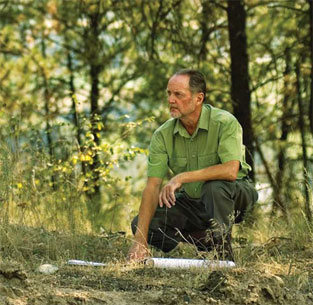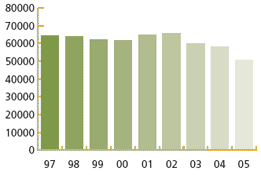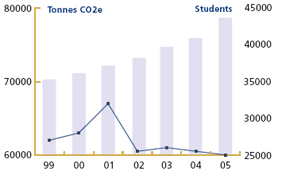Environmental Highlights
In support of Trek 2010’s mandate to "promote the values of a civil and sustainable society," UBC infuses a strong commitment to the environment throughout its academic programs, research, student initiatives and operational decisions -- which is why UBC is recognized as a world leader in campus sustainability initiatives. The World Urban Forum (WUF)UBC and the United Nations Human Settlements Programme (UN-HABITAT) welcomed more than 10,000 delegates from 100 countries to the World Urban Forum in Vancouver in June 2006. Living the Global City, a 60-part speaker series focusing on sustainable cities, attracted more than 4,000 attendees. The Sustainability by Design program facilitated a UBC-led regional planning exercise to help the Greater Vancouver Regional District prepare for an estimated population doubling by 2030. Created by the UBC Design Centre for Sustainability, the Greater Vancouver Green Guide documented Vancouver’s leadership in urban sustainability. Life Sciences Centre Wins LEED GoldA gold Leadership in Environmental Design (LEED) award makes the Life Sciences Centre, home to BC’s expanded medical education program and leading edge research institute, the largest structure in Canada certified by the US Green Building Council. The Province of B.C. contributed $110 million to the construction of the Life Sciences Centre. University TownUniversity Town is an emerging community at the heart of UBC’s academic and cultural core, designed as a series of sustainable neighbourhoods that combine a place to live, work and study without the commute. By using the UBC-developed Residential Environmental Assessment Program, builders are encouraged to use local materials, high-effi ciency appliances and equipment to minimize energy, water consumption and waste production. The University Boulevard neighbourhood, winner of urban design awards from the American Institute of Architects and Royal Architectural Institute of Canada, will introduce a new underground transit station, as well as residential, commercial, academic and administrative buildings into the campus centre. The UBC Hawthorn Place neighbourhood and Wesbrook Place at south campus will also add a new community centre, shopping facilities, and rental and co-development accommodation for faculty, staff and students. Kyoto Targets Exceeded Five Years EarlyNamed a Sustainability Star by University Business, UBC completed the largest university energy retrofit in Canada. The $35-million project will save $2.6 million in annual energy bills and reduce campus water use by 30 per cent. The retrofit will also reduce CO2 emissions by 15,000 tonnes annually, allowing the university to exceed Kyoto Protocol targets five years early. Campus-Wide Sustainability StrategyAs the first Canadian university to open a Sustainability Office (in 1997), UBC continues its leadership in this area with the first campus-wide comprehensive sustainability strategy. Entitled Inspirations and Aspirations, the strategy provides a reporting framework and performance indicators to measure UBC’s progress in meeting key sustainability targets. Carbon CreditsAs Canada Research Chair in Applied Mathematics and Global Change for the Institute for Resources, Environment and Sustainability, Hadi Dowlatabadi is using his research to increase the health of communities -- one consumer at a time. In a growing movement to increase education about the environmental impacts of lifestyle choices, his web-based tools allow individuals and corporations to calculate the cost of their lifestyle choices that can be offset by supporting technologies that reduce greenhouse gases or support sustainability education. Measuring UBC's Impact
|


